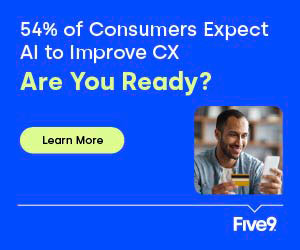Kevin McGachy at Sabio Group explores how data powers excellent CX delivery for contact centre advisors.
We’re finding that one of the biggest CX challenges that our clients face is working out exactly how to capture, organise and act on the potentially billions of data points that are generated as a result of different customer journeys.
Whether it’s digital voice, chatbots or conversational AI, brands are collecting more interaction data than ever before – along with a wealth of information detailing specific customer preferences.
This data explosion is being fuelled by transformational technologies such as Digital First and AI & Automation, along with the accelerated adoption of CPaaS and CCaaS solutions.
But it’s not the volume of data being collected that is the problem, but rather understanding it to release its potential and thus benefit the business.
Joining the Data Dots
While many brands clearly recognise the potential value that’s stored within this data, very few are currently successful in bringing much of this unstructured information together.
A key reason for this is that so much of this data is siloed across different parts of the business. For many brands, for example, the data about what customers have bought is stored in a different place from the data about who you are, your address, and your purchase history, as well as other potential follow-up interactions.
It’s hardly surprising, then, that the customer experience offered is often disjointed and frustrating. In addition, with interactions now expanding across different channels, siloed functions and data can quickly translate into poor customer experience – which is a real problem for brands focussing on CX as a key competitive differentiator.
As customer expectations continue to evolve and increase, it’s vital that CX teams collect the right customer data and use it correctly.
This means collecting information from across all channels, making it available to support both self-service and contact centre operations, and also ensuring that key customer insights are shared consistently with other relevant parts of the business.
Taking Advantage of Data That Already Exists Within Contact Centres
Despite deep customer service expertise, it’s probably fair to say that many contact centre teams still don’t realise the value of the data that they already have – and how they can put it to work.
This data already exists – either within the contact centre or elsewhere in the business – and it simply requires tools and understanding to unlock quick data wins.
Sabio’s Intent Capture & Analysis (IC&A) solution and Twilio’s Segment are great examples of how this can work.
IC&A uses Google Cloud’s Contact Centre AI to uncover the reasons for calls into the contact centre – capturing contact intents and categorising them. This helps CX teams to build rich insights that can support exactly how calls are routed.
Meanwhile, Twilio Segment similarly combines data from multiple tools to create a single centralised customer database containing information on all touch points and interactions. That data can then be segmented to create more personalised experiences.
This intelligence, of course, opens up new opportunities.
Rather than resource planning by traditional skills level, you can start to plan around intent levels, so your teams will be ready and in place to handle the issues that customers are actually contacting you about.
These insights can also help you in terms of responding to customers. Instead of adopting an open call approach, your advisors can use conversation and responses that are more likely to deliver better outcomes in terms of customer satisfaction and retention.
This not only delivers an improved experience for customers but can also unlock quantifiable bottom-line benefits.
Applying existing data to help optimise resource planning can also have a positive impact on training – particularly around onboarding new agents and handling spikes in demand.
If, for example, you’re using IC&A to track your customers’ intent when calling, then you can focus on training new advisors to handle those types of interactions first.
This means your advisors get to start handling customer contacts more quickly, accelerating their time to value.
Balancing Contact Centre Data Needs with Broader Corporate Information Plans
We already work closely with our clients to ensure they have the right integration between their contact centre operations, AI technologies and CRM systems.
This helps to provide a single, unified view across multiple touchpoints. But this only represents part of the story for today’s CMOs, CXOs and CCOs.
Whether it’s enterprise CRM platforms, or the growing portfolio of digital, orchestration and analytics tools employed by marketing departments, there’s a much broader range of solutions that play an integral part in building customer journeys.
So, discussions around sharing critical CX data across the business inevitably are now much more complex. Increasingly organisations are considering the role of Customer Data Platforms to help them break down traditional information silos – but these are often marketing-led.
This means that contact centre leaders need to be actively involved in the corporate data conversation, particularly where information decisions may have an impact on existing contact centre solutions.
Today’s CX teams can’t afford to remain isolated in their separate contact centre, service desk or CRM camps. With the pressure on brands to differentiate via their customer experience, making the right CX technology decisions becomes more important than ever.
The good news is that an effective CX data strategy will deliver significant benefits around improving the customer experience, optimising contact centre resourcing, and empowering advisors in delivering excellent customer service.
For more information about Sabio - visit the Sabio Website
Call Centre Helper is not responsible for the content of these guest blog posts. The opinions expressed in this article are those of the author, and do not necessarily reflect those of Call Centre Helper.
Author: Sabio
Published On: 17th Mar 2023 - Last modified: 30th Aug 2024
Read more about - Guest Blogs, Kevin McGachy, Sabio






 Sabio Group is a global digital customer experience (CX) transformation specialist with major operations in the UK (England and Scotland), Spain, France, Netherlands, Malaysia, Singapore, South Africa and India. Through its own technology, and that of world-class technology leaders such as Amazon Connect, Avaya, Genesys, Google Cloud, Salesforce, Twilio and Verint, Sabio helps organisations optimise their customer journeys by making better decisions across their multiple contact channels.
Sabio Group is a global digital customer experience (CX) transformation specialist with major operations in the UK (England and Scotland), Spain, France, Netherlands, Malaysia, Singapore, South Africa and India. Through its own technology, and that of world-class technology leaders such as Amazon Connect, Avaya, Genesys, Google Cloud, Salesforce, Twilio and Verint, Sabio helps organisations optimise their customer journeys by making better decisions across their multiple contact channels. 





























